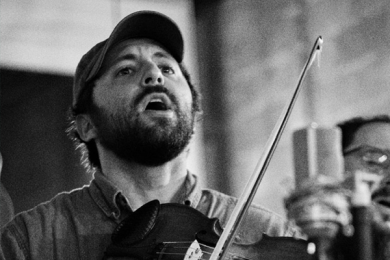Peter Brook's Midsummer, community theatre criticism, and theatre by the playwrights
News
I have become more comfortable with the idea that nothing is eternal, that everything passes and escapes from us, and I wonder if theatre is the culprit.
This thought struck me as I read through Peter Brook's reminisces on his 1970 production of A Midsummer Night's Dream. There are those productions that were playing just last week that I wish I had seen, and I spare them a moment, a sigh, a wish that I had been there, but whatever was going on in my life kept me away, or there was another production playing and I had to be selective. Then there is Brook's Midsummer, a show from 43 years ago that people dearly wish they could have witnessed, even though they, like me, maybe hadn't been born yet and had only read about it in books like Ron Rosenbaum's The Shakespeare Wars.
People will lament that their favorite show or series is ending. Often I am not one of them. And I think theatre has made me that way and I'm a little more comfortable with endings. Not necessarily through storytelling, but through the impermanent nature of the form. The same quality that makes the theatre special also makes it heartbreaking.
And seeing so many shows come and go means we all get to taste a little heartbreak over and over again.
Let's Not Take it Easy on Them
A month ago in the March 18th edition of News & Notes we talked about Lyn Gardner's approach to community theatre reviewing that focuses on the work. A recent review by Gazette editor Sarah Thomas about the Salem Theatre Company's Split: Tales of Escape caused a write-in from local actor and former columnist for the Gazette Jeff Bellin, which has been collected, along with Thomas' response, here.
Reading through it without the introductory paragraph, I'm not sure I would have picked up on the ethics of reviewing community/non-profit theatre vs. professional theatre debate (I even wrote back to Minnesota Playlist editor Ira Brooker trying to parse my thoughts and get a better handle on it). Thomas advocates for being honest and "showing your work" regarding what you thought about a production--your reaction doesn't happen in a vacuum, and you should be prepared to make your readers understand your perspective. Bellin too advocates for the honest approach, but scaled to fit the level of the production.
And I get both those points of view, but criticism of a production, whether from your local community theatre all the way on up to the Guthrie, is important. There are those at the community, non-profit level that have aspirations of working in front of larger audiences, and they will need the tools to process criticism leveled at them. They don't really teach classes in how to react to a bad review (I'm curious if someone has!), and it seems like often the only reaction is to lash out at the critic. That's not the only reaction to take--Thomas mentions the sometimes negative notices for her and the ensemble she worked with in the past, and how that ultimately made them a better ensemble.
I want to read other perspectives on this, so if you have some, leave them in the comments. As we discussed a few weeks ago in Criticismpalooza, now is a fascinating time for theatre criticism and the why of work as HowlRound pushes its NewCrit Critics even as Backstage ceases its production of reviews in its print and online versions.
The Loo Situation
Josie Rourke, the artistic director of the Donmar Warehouse, is amazingly quotable. Mark these quotes from her Guardian interview:
"I think authority comes from authenticity."
"You have a responsibility to follow your actors' instincts. Someone might be offering something interesting, or good. But in the end, good directors never give up. It's about rigour."
"We make theatre like the Brazilians play football--and why you wouldn't want to preserve something that precious, I just don't know."
Not only that, she's concerned with the bar and loo situation at her theatre. Which makes me wish that someone, anyone, would devote some time to the loo situation at the Theatre Garage.
Playwright's Parade
I am enamored with the idea of allowing playwrights to be fully in charge of The Royal Court's summer season in what they're calling a "summer fling." This includes programming by Caryl Churchill and Martin Crimp, and handing over the theatre to children for a week, allowing them to write, perform, and direct their own material. I hope it's being given over to 5 year olds, so we can have the theatrical equivalent to Axe Cop.
The Guthrie seems to have come at this idea from a different angle with the Tony Kushner and Christopher Hampton festivals. But even with that semi-precedent, I'm surprised at how new an idea like giving playwrights the run of the theatre seems, and how marketable. There are a variety of different events planned by The Royal Court, all of which seem to be fostering involvement with audiences and advocating playwrighting on a more personal level.
No LaBeouf here!
I've gone on and on from week to week about the continuing saga of Orphans on Broadway. Short of flying out to seeing it and reporting back to you, likely that won't be continuing. Although I keep saying that with each time I write about it, yet here we are again.
It would seem like time hasn't been kind to the Orphans script, if the New York Time's review is any indication. I got the impression that critic Ben Brantley saw it as quaint. An audience "chuckling" and "awwwing" to the violence onstage engages me in the center of my brain that desires to know why and how those moments hit the audience. It also makes me inclined to wildly speculate about how the culture has changed in the past 28 years since Orphans was first staged Off-Broadway in 1985. When it first debuted, this was a play known for its ferocity, and now it appears to fall flatter. Does it come down to direction, or has the culture moved on?
Which means I should probably book those tickets for New York and see for myself.
Longing, Frustration, and Desire
Hat tip to Brian O'Neal at Arts Junkie TC for posting a link to Anne Bogart's ruminations on the creation of work. We began with reminiscing on theatre past, and now we turn to face the many motivations for its current creation.
---
If you have feedback or comments on any of the articles above, or suggestions for future blog and news items, please leave them in the comments or e-mail me at [email protected].




